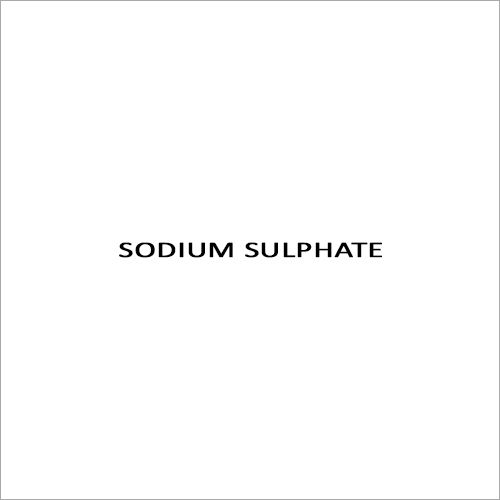Call Us Now :-08045478346

Sodium Sulphate
Product Details:
X
Product Description
Sodium sulfate, also known as Glauber salt, is an inorganic compound with the chemical formula Na2SO4. It is a white, crystalline solid, and its appearance may vary depending on the level of hydration. Sodium sulfate can exist in anhydrous form (without water molecules) or as various hydrates (with water molecules).
Some common forms of sodium sulfate include:
1. Anhydrous sodium sulfate: This is the anhydrous form of the compound, meaning it does not contain any water molecules. It is used in various industrial applications, including in the manufacture of detergents, paper, and glass.
2. Sodium sulfate decahydrate: This is the most common hydrated form of sodium sulfate, often found as colorless crystals. It is used in the chemical industry, as a filler in synthetic detergents, and in some bath salts.
3. Sodium sulfate heptahydrate: This is another hydrated form of sodium sulfate, with seven water molecules per molecule of sodium sulfate. It has some niche applications in chemistry.
Uses of Sodium Sulfate:
1. Detergent Manufacturing: Sodium sulfate is commonly used as a filler or diluent in the production of powdered detergents. It helps add bulk to the detergent and improves its flow properties.
2. Paper Industry: In the paper making process, sodium sulfate is used as a pulping agent and helps separate wood fibers from the other components of the wood.
3. Glass Industry: Sodium sulfate is used in the glass-making process to reduce the melting temperature of silica and improve the workability of the molten glass.
4. Textile Industry: It is used in the dyeing process as a leveling agent, helping to even out the color distribution on textiles.
5. Chemical Industry: Sodium sulfate serves as a reactant in various chemical reactions and is used to produce other chemicals and compounds.
6. Pharmaceutical Industry: In some cases, it is used as a laxative, though other laxatives are more commonly used.
Sodium Sulphate Properties:
Sodium sulfate (Na2SO4) possesses several important properties, both physical and chemical. Here are some of the key properties of sodium sulfate:
Physical Properties:
- Appearance: Sodium sulfate is a white, odorless, and crystalline solid.
- Density: The density of anhydrous sodium sulfate is around 2.66 g/cm3, and the density of its decahydrate form is approximately 1.464 g/cm3.
- Solubility: Sodium sulfate is highly soluble in water. At room temperature, approximately 18.5 grams of sodium sulfate can dissolve in 100 grams of water.
- Hygroscopicity: The anhydrous form of sodium sulfate has hygroscopic properties, meaning it can absorb moisture from the atmosphere and form hydrated salts.
- Crystal Structure: Anhydrous sodium sulfate and its decahydrate form crystallize in the orthorhombic crystal system.
Chemical Properties:
- Hydrates: Sodium sulfate can exist in various hydrates, including the decahydrate and heptahydrate forms, depending on the conditions of formation.
- pH: When dissolved in water, sodium sulfate solutions are generally neutral, having a pH close to 7.
- Dehydration: Hydrated forms of sodium sulfate can lose their water molecules upon heating, converting back to the anhydrous form.
- Reducing Agent: Sodium sulfate is not a reducing agent; it does not undergo reduction-oxidation (redox) reactions under normal conditions.
- Stability: Sodium sulfate is chemically stable under typical conditions but may decompose at very high temperatures.
FAQ:
Q. What is sodium sulfate?
Ans: Sodium sulfate, also spelled as sodium sulphate, is an inorganic compound with the chemical formula Na2SO4. It is a white, crystalline solid and can exist in different hydrated forms depending on the presence of water molecules.
Q. What are the different forms of sodium sulfate?
Ans: Sodium sulfate can exist in anhydrous form (without water molecules) and several hydrated forms, with the decahydrate being the most common.
Q. What are the main uses of sodium sulfate?
Ans: Sodium sulfate has various industrial applications, including its use in the manufacture of detergents, paper, and glass. It is also used in the chemical industry, textiles, and metallurgy.
Q. Is sodium sulfate safe for consumption?
Ans: In small quantities, sodium sulfate is generally considered safe for consumption and is sometimes used as a laxative. However, excessive ingestion can lead to health issues, so it is essential to follow proper safety guidelines and instructions.
Q. Is sodium sulfate soluble in water?
Ans: Yes, sodium sulfate is highly soluble in water. It can readily dissolve in water to form a clear solution.
Q. Does sodium sulfate have any other names?
Ans: Yes, sodium sulfate is also known as Glauber salt and has historically been used for various purposes, including medicinal applications.
Q. What are the physical properties of sodium sulfate?
Ans: The physical properties of sodium sulfate include being a white, odorless, crystalline solid with different densities for the anhydrous and hydrated forms.
Q. Can sodium sulfate absorb moisture from the atmosphere?
Ans: The anhydrous form of sodium sulfate is hygroscopic, meaning it can absorb moisture from the atmosphere and form hydrated salts.
Q. What is the pH of sodium sulfate solutions?
Ans: When dissolved in water, sodium sulfate solutions are generally neutral, having a pH close to 7.
Tell us about your requirement

Price:
Quantity
Select Unit
- 50
- 100
- 200
- 250
- 500
- 1000+
Additional detail
Mobile number
Email
 English
English Spanish
Spanish French
French German
German Italian
Italian Chinese (Simplified)
Chinese (Simplified) Japanese
Japanese Korean
Korean Arabic
Arabic Portuguese
Portuguese






